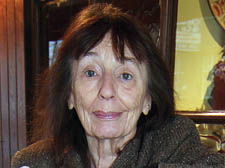|
|
 |
| |

Beryl Bainbridge |
Dame Beryl's gymslip secret
The prize-winning novelist explains how it was her curious childhood experiences that
turned her into a writer
THE time Beryl Bainbridge’s ex-mother-in-law tried to shoot her, her childhood amid warring parents and her expulsion from school – these were among the rich seams of the Camden Town literary dame’s memory that emerged before an enthralled audience at Burgh House, Hampstead, on Thursday.
Dame Beryl was interviewed by BBC producer Piers Plowright who noted that she had written some 21 novels and won just about every literary prize available, from the Whitbread Award (twice) and the James Tait Black Memorial Prize, to the Guardian Fiction Prize and many more.
And yet, Dame Beryl, who lives in Albert Street, revealed: “The only reason I ever became a writer was because of the sort of childhood that I had.”
Her parents had married when her father, as the saying went in Liverpool, “was in a good way of doing”. But bad times were to follow and in the late 1920s he was made a bankrupt which, she said, was a terrible thing in those days.
“It obviously ruined their lives, because all that I can remember from very early on was the terrible, terrible brutal rows that they had constantly. My father never laid a finger on anyone, but the terrible scenes transformed him from this rather funny and generous man into a horror,” she said.
“I became a clown and a show-off in order to get through the rows. That was my role. My brother got out of it by going to the church a lot and joining the choir, but I was five years younger and I couldn’t escape.”
She also told how she had later been expelled from the private Merchant Tailors’ School outside Liverpool, after her mother had found a dirty rhyme in the pocket of her gymslip. Her mother had gone straight to the headmistress with it.
“For two nights I had to sleep in the bath, because I was so sinful. But the odd thing was that although I was shocked that I had upset my parents so much, I just knew they were making an awful fuss about nothing and that one day it would all not matter.
After that she went to work at the Liverpool Playhouse and – after a brief period when she ran away to London and lived in Parliament Hill for a few weeks – she became an actor. Then love interfered. Beryl fell in love with a painter by the name of Austin Davies – “and that’s all I ever wanted; to be happy and have lots of children.
“I knew I had to get out of my head all the nasty things about my childhood, but I thought that they would go away once I was married.”
The trouble was that two years later her husband left her, with two children. “So I started writing.”
Two books were published, but her big break came when Anna Haycraft (later to be known as Alice Thomas Ellis) at Duckworth agreed to publish her very first book, Harriet Said, which other publishers had rejected as “too indecent”.
After that she wrote about one book a year for the next 10 years.
Dame Beryl said that she writes in a room at the top of her house, using a “computer thingy” (because nobody could mend her old manual typewriter).
She normally gets up at 6am and works through to midday. She then has something to eat, has a nap, and then goes back to work again. She watches Newsnight and then writes some more – until about 3am.
“When I’m working I hardly sleep at all, but I don’t feel tired. I constantly redo things. I won’t do another paragraph until I’ve redone the previous one. Then I read it aloud, and then I put it down and then I read it again five minutes later. And I will go on doing that for hours.”
Dame Beryl revealed that the book she is currently working on, The Girl in the Polka Dot Dress, centres on the identity of a mystery woman who was in the kitchen of the Ambassador’s Hotel in Los Angeles the night Bobby Kennedy was shot.
Her own shooting incident took place some years ago when she was already living in Camden Town. Her deranged ex-mother-in-law came to her door demanding some family photographs, and when Beryl turned to go up the stairs to look for them, the woman pulled out a gun and shot at her.
“The bullet missed and lodged in the staircase ceiling.
“She went off then, and stopped a police car to tell them what she had done – and for some reason they just let her go. The police did come round, and I told them what had happened. Apparently she was very distressed and had thought that I was her and that I had left the children.
“She went off down to Devon, where a year or two later she jumped off a station platform into the path of a train. So that was the end of her.”
nwww.burghhouse.org.uk
MATTHEW LEWIN |

|
 |
|
 |
|

